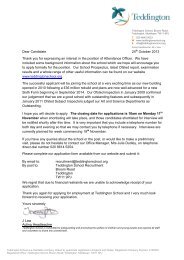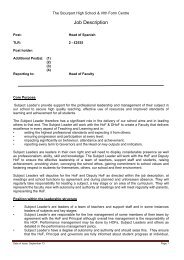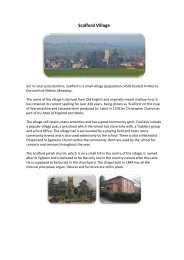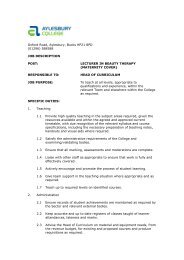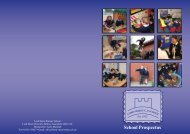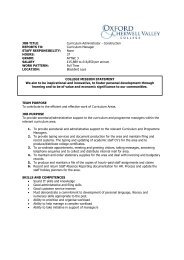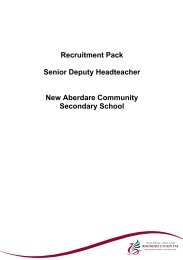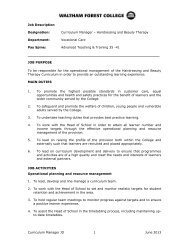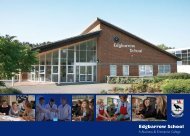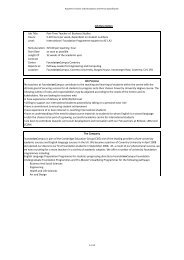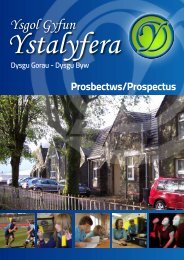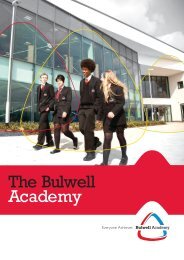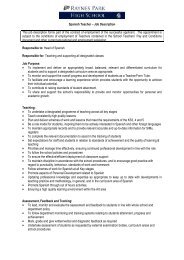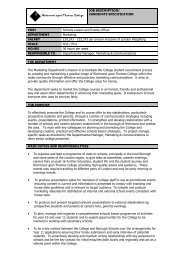School Prospectus 2011 - Sir Bernard Lovell School
School Prospectus 2011 - Sir Bernard Lovell School
School Prospectus 2011 - Sir Bernard Lovell School
You also want an ePaper? Increase the reach of your titles
YUMPU automatically turns print PDFs into web optimized ePapers that Google loves.
“We identify, encourage anddevelop individual intellectual andcreative talents and skills”DAVID TURRELL, EXECUTIVE HEADTEACHER<strong>Sir</strong> <strong>Bernard</strong> <strong>Lovell</strong>Physicist and radio astronomerThe school was named after <strong>Sir</strong> <strong>Bernard</strong><strong>Lovell</strong> who was born in OldlandCommon, Bristol. He studied physicsat the University of Bristol, where heobtained a PhD in 1936.His first research was into cosmic raysat the University of Manchester whichhe continued until the outbreak ofWorld War II. During this time he didvaluable research into the use of radarfor detection and navigation purposesfor which he was awarded an OBE for hiswork in 1946.After the war he continued working withcosmic rays in Manchester for an exmilitaryradar unit. Following a problemwith electrical interference from trams,<strong>Lovell</strong> moved to Jodrell Bank, an openspace 20 miles south of Manchester,where he was given permission toestablish the Jodrell Bank Laboratory,of which he became director in 1951.That same year, a special academicchair was created for him at ManchesterUniversity: he became professor of radioastronomy. He showed that radar echoescould be obtained from daytime meteorshowers which are invisible using opticalastronomical techniques.With university funding he constructedthe then largest steerable radio telescopein the world (completed 1957), which nowbears his name – the <strong>Lovell</strong> Telescope.Nearly 50 years later, it remains one of theforemost radio telescopes in the world.He was knighted in 1961 for his importantcontributions to the development of radioastronomy. <strong>Sir</strong> <strong>Bernard</strong> <strong>Lovell</strong> officiallyopened our school in 1972.
“In Junior Academy the structure of the students’day allows more time to build working relationshipsand collaboration in variety of activities as explorersand citizens”
AN INTERNATIONAL COMMUNITY OF LEARNERS“We nurture each child as an individual andprovide a high quality of care to ensure thatthey are happy at school”A caring communityWe aim to provide the highest qualitycare, support and guidance for allstudents. We have excellent relationshipswith our partner primaries and visit themto find out about each child before theyarrive. Students are placed in carefullybalanced tutor groups which also reflecttheir friendships. The daily tutor periodis an important time for developinginterpersonal skills as well as for workingon activities to enhance literacy skills.Each year group is supported by a nonteachingyear assistant who can becontacted during the day and who canoffer extra support. We also have a studentsupport team who provide counsellingand other specialist support.In Junior Academy the structure of thestudents’ day allows more time to buildworking relationships and collaborationin a variety of activities as ‘explorers’and ‘citizens’.Our mixed-age house system in SeniorAcademy encourages co-operation,competition, and a sense of belonging toa smaller community within the school.Students enjoy taking on responsibilitiesas house captains and sports leaders, andfund-raising for charity.We promote healthy eating and lifestylesthrough our personal developmentcurriculum. To ensure that they feel safe,students have a secure environment forsocial activities at breaks and lunchtimesand anti-social behaviour and bullying arenot tolerated.Year and <strong>School</strong> Councils play a key part inthe life of both Academies, with students’views being sought frequently on allaspects of school life.<strong>Sir</strong> <strong>Bernard</strong> <strong>Lovell</strong> <strong>School</strong>THE <strong>Sir</strong> <strong>Bernard</strong> <strong>Lovell</strong> SCHOOL: Judged ‘Outstanding’, Ofsted <strong>2011</strong> 7
AN INTERNATIONAL COMMUNITY OF LEARNERSJunior AcademyJunior AcademyTransition from primary schoolThe Junior Academy is comprised ofyears 7 and 8 and has its own discretearea of the school. It has a distinctethos of building on children’s previouslearning experiences. We work veryclosely with our partner primaries toensure that the transition is smoothand happy.The schools work together on curriculumprojects and transition programmes. Year6 students visit for a transition day in Julyto meet their new tutor group, make newfriends and get to know the teachers andthe layout of the school.Close liaison with our primary colleagueshelps us to respond effectively toyour child’s needs, ensuring that theyhave sufficient support and challenge.Partnership with parents is vital.Your child’s success depends on thequality of our work together so weencourage parents to tour the schoolduring the working day.To make an appointment to visit theschool contact Mrs Wren on01454 868 025 or swren@sblonline.org.ukTracy HartDirectorJunior AcademyChristine JohnsonDeanJunior Academy8THE <strong>Sir</strong> <strong>Bernard</strong> <strong>Lovell</strong> <strong>School</strong>: Judged ‘Outstanding’, Ofsted <strong>2011</strong>
AN INTERNATIONAL COMMUNITY OF LEARNERSJunior Academy“We strive to ensure the very highest levels ofacademic achievement for all of our studentsregardless of ability”THE <strong>Sir</strong> <strong>Bernard</strong> <strong>Lovell</strong> SCHOOL: Judged ‘Outstanding’, Ofsted <strong>2011</strong> 9
AN INTERNATIONAL COMMUNITY OF LEARNERS“…digital technology makes it easier thanever before for students to conduct seriousresearch, produce high-quality work, keepa record of the entire process, and sharetheir creations with the world”WORK THAT MATTERS’, THE INNOVATION UNIT, LONDONJunior AcademyEnquiry-based learningOur school is one which developsindividuals who love to learn, whoare creative and questioning, andwho feel confident undertaking thechallenges that will enable them tothrive in the adult world. Some of theJunior Academy curriculum is deliveredthrough Enquiry-based learning.Through a system of critique throughoutthe process, teachers and students workhard together to ensure that progress ineach subject area is strengthened anddeveloped.Students will be assessed at six weeklyintervals.Enquiries last from 2-6 weeks, and arefocused around a range of EssentialQuestions designed to encouragestudents to explore, collaborate, lead andresearch real life issues. Students’ workculminates in a public exhibition andcelebration of learning.THE <strong>Sir</strong> <strong>Bernard</strong> <strong>Lovell</strong> SCHOOL: Judged ‘Outstanding’, Ofsted <strong>2011</strong> 11
AN INTERNATIONAL COMMUNITY OF LEARNERSJunior AcademyThe Junior curriculumThe curriculum in years 7 and 8 builds onthe skills, knowledge and understandinggained at primary school. It focuses onthe development of the competenciesof collaboration, contribution andcommunication. The curriculumencourages creativity, innovation,and an important understanding ofinternationalism.Students in years 7 and 8 cover the broadcurriculum areas outlined below and thereis an emphasis on an enquiry approach,which helps develops students’ broadercompetencies. There is a real world contextto students’ work. The curriculum at SBLis designed to challenge students to strivefor their personal best, to enable themto achieve outstanding results in nationalexaminations and to become responsibleglobal citizens who make a valuablecontribution to society.The use of technologies is taught andintegrated with student learning. All workingspaces have interactive whiteboards and allstudents have assess to ICT. Students haveaccess to iPads, a variety of suites and WiFito support and enhance learning.personal safety, relationships, bullying, anda whole range of health and well beingtopics. We use a variety of methods fordelivery, including external visitors andhealth professionals, theatre companies,theme days and curriculum based projects.Students may also choose take part inpractical activities such as cycle proficiencytesting and basic first aid training which areoffered during the course of the year.Hours perfortnightCreative and Media 6Design and Technology 4English 7Humanities 9Maths 7Modern Foreign Languages 7Physical Education 4Science 6Students in Junior Academy follow a broadprogramme of personal developmentwhich covers areas such as e-safety and12THE <strong>Sir</strong> <strong>Bernard</strong> <strong>Lovell</strong> <strong>School</strong>: Judged ‘Outstanding’, Ofsted <strong>2011</strong>
AN INTERNATIONAL COMMUNITY OF LEARNERSJunior AcademySubjects: Junior AcademyEnglishEnglish is essentially about communicationand we explore how to speak, listen, readand write. In Enquiry-based learning wework in pairs and small groups learninghow to create, cooperate and collaborate.We study how to prepare and givepresentations to a range of audiences.Students read, discuss and write about arange of fiction and non-fiction texts thatare linked to their projects. This includespre-twentieth century texts as well asmore contemporary works.We encourage students to read widelyfor pleasure inside and outside of Englishlessons and hope that adults will readalongside them and talk with them abouttheir reading experiences.Students write formally and informally for avariety of public audiences and purposes.Students build on their knowledge ofspelling, punctuation and grammar fromprimary school and continue to develop arich and extensive vocabulary.Our aim is for students to recognise thathigh quality, accurate writing is moreimportant than quantity and that we areall working together and taking pride inproducing excellent work.MathematicsStudents are placed in mixed ability groupsin years 7 and 8 and learn Mathematicsthrough a combination of Enquirybasedlearning and Inquiry intensives.Mathematics is taught through eleventopic areas which are visited at least onceeach year.Projects include transformations, statistics,construction and probability while othercomplex mathematical concepts suchas algebra, proportion, graphics andsequences are delivered through moreopen-ended inquiry-based tasks. Studentsare assessed through testing and use ofon-line homework tasks.There are many enrichment activitiesto challenge the more able. Theseinclude in-house competitions andthe UK Mathematical Trust JuniorMaths Challenge.ScienceOur aim is to equip students with thescientific knowledge and understandingthat will allow them to make sense of thescience that affects our individual lives andwider society. In years 7 and 8 students14THE <strong>Sir</strong> <strong>Bernard</strong> <strong>Lovell</strong> <strong>School</strong>: Judged ‘Outstanding’, Ofsted <strong>2011</strong>
AN INTERNATIONAL COMMUNITY OF LEARNERS“...a high proportion of students achieve onelanguage at grade C or above, and a quarter ofstudents achieve two”Junior Academyare taught in mixed ability groups througha range of topics spread evenly acrossthe disciplines of Biology, Chemistryand Physics.Topics covered in year 7 include electricity,acids and alkalis, space, and ecology.In year 8 topics include rocks, forces,health, microbes and diseases. There isan emphasis upon active learning, andenrichment opportunities include visitsto places of scientific interest, and inputfrom visiting scientists, such as expertsin rocket technology.Modern Foreign LanguagesInternationalism is at the heart of ourJunior Academy scheme of work and wework closely with schools in Europe andfurther afield during the three years ofstudy. Students have 7 hours of French orGerman in year 7 per fortnight. We provideour students with a strong grammaticalgrounding as well as vocabulary andstructures.We start the course with lessons on thesolar system; we introduce pronunciationrules of French and German through theplanets. We then teach students seasons,numbers and time. Afterwards, in each ofthe three years, the learning is dividedinto three:In terms 1 and 2 learning focuses on theUK, Bristol, Oldland Common, SBL, ourstudents, their lives and hobbies and theirdaily routines.In terms 3 and 4 learning focuses onFrance, Europe and a French student’sperspective.In terms 5 and 6 learning focuses outsideof Europe on a French speaking school ina developing country.THE <strong>Sir</strong> <strong>Bernard</strong> <strong>Lovell</strong> SCHOOL: Judged ‘Outstanding’, Ofsted <strong>2011</strong> 15
AN INTERNATIONAL COMMUNITY OF LEARNERSJunior AcademyDesign and TechnologyIn Junior Academy Design andTechnology we strive to developconfident, creative, future-proof learners.Throughout years 7 and 8 studentsundertake six projects, each of whichis linked to a Design and Technologyspecialism: resistant materials, food,textiles, systems and control and graphicsEach project is fine-tuned to develop aspecific range of design technology skillsand knowledge. This combination of skillsdiffers for each learner as they havethe opportunity to personalise their projectoutcomes.Assessment is a crucial element to theDesign and Technology curriculum andis approached in a variety of ways. At theend of each project students are providedwith a summative assessment thatincludes a working level and a target forimprovement. Students are also supportedthrough frequent self and peer assessmentduring the drafting and developmentstages of their projects. The targetsgenerated from this process contributeto an ethos of continuing personaldevelopment.Able, gifted and talented students areencouraged to be more ambitious withtheir project outcomes, using a widerrange of equipment and processes todemonstrate a higher level of skillsand understanding.Junior Academy students can attend aweekly graphics club.Computer and e-LearningThe school has excellent computing ande-Learning facilities. One-to-one accessto iPads is in place for students andthere are a variety of computing suitesavailable in different areas of the school.Technology use permeates throughout theschool, helping prepare our students for atechnology rich future includingsecure WiFi.Computing is embedded in to theEnquiry-based learning curriculum inJunior Academy where students receive abespoke, relevant and exciting curriculumin computing.Across Junior Academy students have theopportunity to experience both developerand user experiences, which lead forwardto those two routes at GCSE level.Creative and MediaWe believe that the Arts play an essentialrole in all students’ development,encouraging an appreciation of others’work and cultures, and enabling studentsto gain confidence through the expressionof their own ideas.Creative and Media encompasses thedisciplines of Art and Design, Music,Performance and Dance. Students learnthrough an Enquiry Based Learning16THE <strong>Sir</strong> <strong>Bernard</strong> <strong>Lovell</strong> <strong>School</strong>: Judged ‘Outstanding’, Ofsted <strong>2011</strong>
AN INTERNATIONAL COMMUNITY OF LEARNERSapproach, often integrating differentdisciplines within the same project. UsingEssential Question method, studentsexplore a range of ideas, skills andtechniques (research, creativity, teamwork,imagination, planning, critique) leadingto a creative outcome – eg a piece ofartwork, a performance piece or anoriginal composition. Work is completedboth individually and in groups.iPads are an integral aspect of learningwithin Creative and Media. Students usethe iPads as a learning tool for planning,organisation and reflection as well as atool for creative work using specialistapps and websites. Students have regularopportunities to exhibit their work in avariety of contexts.There is a range of extra-curricularopportunities; Nexus InternationalPerforming Arts (NIPA) is our in-houseperformance company for bothperformers and technicians. Musicensembles and choirs rehearse everyweek and instrumental tuition is available;art clubs are run for students after schooland all students take part in the nationalBig Draw competition each year.Enrichment opportunities:• One major NIPA production everyyear, rehearsals on Wednesdayevenings and some Sundays• NIPA theatre technicians – weeklytraining for students interested intechnical theatre• Dance club• Instrumental and singing tuition• Choir and chamber choir• Classic rock ensemble and soul bandHumanitiesThe curriculum in Junior Academyincludes History and Geography andReligious Studies. Students learnthrough an Enquiry-based approachand incorporate the work from severalhumanities disciplines and English intotheir work.Students learn how to:• Collect, analyse and communicateusing a range of data• Evaluate a range of sources• Think critically and put forwardarguments supported by evidence• Recognise and put forward differentinterpretations• Communicate ideas clearly, logicallyand fluently with accurate use ofspelling, punctuation and grammarEnquiry based Projects focus uponEssential Questions which guide studentsto work in collaboration to explore andresearch real world issues.Students use critique sessions to reflecton the quality and content of their work.Formal assessments take place usingNational Curriculum levels. Each unitof work is assessed every six weeks andstudents receive written feedback for classwork and extended work.Junior AcademyTHE <strong>Sir</strong> <strong>Bernard</strong> <strong>Lovell</strong> SCHOOL: Judged ‘Outstanding’, Ofsted <strong>2011</strong> 17
“Our students have represented the area and thecounty in athletics, cross-country, cricket, football,hockey, netball and rugby”
AN INTERNATIONAL COMMUNITY OF LEARNERS“Students learn how to communicate ideasclearly, logically and fluently with accurateuse of spelling, punctuation and grammar”Junior AcademyAll year 7 students take part in a field trip totwo castles in Wales in the autumn term.In the summer term, they all take part in afield trip to the Mshed, Bristol docks andBristol city centre.Physical educationEnrichment opportunities:There is a lively extra-curricular programmecovering a range of games and activitiesbased upon student choice. Studentshave represented the area and county inathletics, cross-country, cricket, hockey,netball, football, rugby and swimming.We are highly committed to encouragingstudents to develop healthy activelifestyles. Students are able to participatein a broad variety of sports and activitieswhich are all delivered in our SportsCentre complex.In Junior Academy the focus is very muchon developing both the physical skills andthe leadership skills to undertake a varietyof roles in sport. Students learn abouthealth and fitness and how to designtheir own fitness programmes. Studentsalso have access to a range of specialistcoaches who visit our team throughoutthe year, including coaches for tennis,rugby, cricket and golf.THE <strong>Sir</strong> <strong>Bernard</strong> <strong>Lovell</strong> SCHOOL: Judged ‘Outstanding’, Ofsted <strong>2011</strong> 19
AN INTERNATIONAL COMMUNITY OF LEARNERS“The ethos of the Senior Academy ispurposeful and founded on mutual respect”Senior AcademySenior AcademyThe <strong>Sir</strong> <strong>Bernard</strong> <strong>Lovell</strong> Senior Academyincludes students in years 9, 10 and11 and takes a collegial, co-operativeapproach to learning. Students areencouraged to view their teachersas partners in the learning journeyand to treat them as a resource inachieving success.The ethos of the Senior Academy ispurposeful and founded on mutual respectwith a clear focus on the potential of eachstudent. The Senior Academy intendsthat all students will progress from The<strong>Sir</strong> <strong>Bernard</strong> <strong>Lovell</strong> <strong>School</strong> into productiveand fulfilling lives which will build upon asound and inspiring education.Students and teachers work in adedicated area of the school in specialistaccommodation. All classrooms containinteractive whiteboards and students haveaccess to mobile technology to extendtheir learning.The Senior Academy places greatemphasis upon all students achievingtheir full potential including throughhigh attainment in public examinations.Teachers provide engaging lessons andstimulating learning experiences.Students are prepared for a wide range ofqualifications and can select from a broadrange of options at the end of year 9 tocreate a curriculum which reflects theirinterests. Students receive personalisedinformation, advice and guidance abouttheir future career path, including careersfairs, visiting speakers, one-to-onementoring and mock job interviews.20THE <strong>Sir</strong> <strong>Bernard</strong> <strong>Lovell</strong> <strong>School</strong>: Judged ‘Outstanding’, Ofsted <strong>2011</strong>
AN INTERNATIONAL COMMUNITY OF LEARNERSWe track students’ progress very activelythroughout the Senior Academy and theyreceive academic mentoring regularly bytheir tutor, when progress is reviewed andtargets are set. Mentoring sessions reviewpersonal growth in these areas as a meansof supporting academic ambition.A tutor consultation day is held forstudents and parents each autumn, inaddition to subject-based parents’ eveningsfor each year group.The good relationships achieved throughmentoring and tutoring are fundamentalto the collegial ethos and co-operativevalues of strong social responsibility and acaring community. All students, along withother members of their tutor group, aremembers of a House, through which weencourage students to involve themselvesin the wider life of the school.Activities range from community projectsand charity fund raising to participation insport, leisure, exhibition and performance.To support our co-operative values ofopenness and honesty we engage stronglywith student voice and our student council.We regard ourselves as collaborativepartners in a shared pursuit of successand wellbeing.Senior AcademyStuart HillDirectorSenior AcademyKatherine BluemanCo-DirectorSenior AcademyLucy AlisonDeanSenior AcademyTHE <strong>Sir</strong> <strong>Bernard</strong> <strong>Lovell</strong> SCHOOL: Judged ‘Outstanding’, Ofsted <strong>2011</strong> 21
AN INTERNATIONAL COMMUNITY OF LEARNERS“The school could not have done more tosupport [my son]”YEAR 9 PARENTThe Senior curriculumSenior AcademyThe curriculum in years 9-11 buildsupon the competencies and knowledgegained in Junior Academy years 7 and8. Students study a very broad range ofsubjects: English, Maths, Modern ForeignLanguages, Physical Education andScience are studied by all students. Inaddition, year 9 students study Creativeand Media subjects (Art, Music andPerformance), Geography and History.In year 9 students make a choiceabout which areas to concentrate onin years 10 and 11. The curriculum iskept deliberately broad with studentschoosing to study one of a wide rangeof subjects throughout a full day and ahalf each week. Students are also giventhe opportunity to complete the researchProject, a qualification which enablesthem to build on one or more of theirchosen areas of study. All students havethe opportunity to gain accreditation viathe Modern Baccalaureate, a qualificationwhich provides students with theopportunity to demonstrate achievementin a wide range of competencies. Thecurriculum provides students with theskills to develop into young adults andto enables them to progress to Post-16courses via outstanding results in nationalexaminations.22THE <strong>Sir</strong> <strong>Bernard</strong> <strong>Lovell</strong> <strong>School</strong>: Judged ‘Outstanding’, Ofsted <strong>2011</strong>
AN INTERNATIONAL COMMUNITY OF LEARNERSYear 9Hours per fortnightCreative and Media 6Design and Technology 4English 6Geography 3History 3Computer and e-Learning 2Maths 6Modern Foreign Languages - first 5- second 2Personal Development Curriculum 4Physical Education 4Science 5Years 10 and 11English 7Maths 6Modern Foreign Languages 5Science 9Triple Science 13Principal Learning option on one full day 10Additional Learning option on one full half day 5Personal Development Curriculum 4Physical Education 4Senior AcademyTHE <strong>Sir</strong> <strong>Bernard</strong> <strong>Lovell</strong> SCHOOL: Judged ‘Outstanding’, Ofsted <strong>2011</strong> 23
AN INTERNATIONAL COMMUNITY OF LEARNERS“The school provides outstanding care andguidance for students in order to supporttheir learning”Subjects: Senior AcademySenior AcademyEnglishEnglish in the Senior Academy focuses onthe skills of speaking and listening, readingand writing. Speaking and listening involvedrama, group discussions and individualpresentations, as well as the study of howpeople speak as they do – such as howpeople speak at home or how presentersinterview on television. Reading involvesanalysing, exploring and enjoying a rangeof novels, poetry, plays and media texts.Writing includes creating descriptive andnarrative pieces as well as functional ‘realworld’ work, for example learning how towrite letters, speeches and reports.English is a key qualification as it showsfuture employers that students can speakeffectively in a group situation and thatthey can speak clearly and confidently.English lessons teach students howto write accurately enabling them tocomplete written tasks more successfully.Reading a variety of different texts preparesstudents for the many different typesof texts they encounter in theirchosen career.MathematicsIn years 9, 10 and 11 students are groupedinto two parallel sets chosen by the abilityand potential shown throughout years7 and 8. Two groups consist of studentswho have shown very strong ability inMathematics and are likely to achieve anA or A*, possibly with the aim of studyingMathematics at A level and beyond.24THE <strong>Sir</strong> <strong>Bernard</strong> <strong>Lovell</strong> <strong>School</strong>: Judged ‘Outstanding’, Ofsted <strong>2011</strong>
“Creative and Media options are extremely popularat Senior Academy and we have a long record of highlysuccessful theatrical productions”
AN INTERNATIONAL COMMUNITY OF LEARNERSSenior AcademyThe next four groups mainly consist ofstudents expected to gain grades B-D,although these students still have theopportunity to attain grades A and A*.The final four groups are small, usuallycomprising fewer than twenty studentswho are expected to gain grades C-G.Most students at The <strong>Sir</strong> <strong>Bernard</strong> <strong>Lovell</strong><strong>School</strong> gain a C or above in Mathematics.Students follow the Linear Edexcel GCSE inMathematics. This means that they sit twoexaminations at the end of year 11, onecalculator and one non-calculator paper,each making up 50% of the final markThere is no longer a coursework element.For our mathematically gifted students,we run an accelerated early entry course,providing the opportunity to study alevel 3 qualification in year 11 in parallelwith the GCSE. This gives these studentsthe opportunity to study higher levelMathematics in detail, in preparation for alevel and possibly further Mathematics.Enrichment opportunitiesIn Senior Academy these include the UKMathematical Trust’s Intermediate MathsChallenge, internal House competitionsand Maths days run by the Further MathsNetwork which inspire students to considerstudying Maths Post-16 and beyond.Computer and e-LearningThe school has excellent Computing,e-learning and ICT facilities. In SeniorAcademy students can opt to followdifferent learner pathways, tailored totheir interests and needs. Both developer(computing) and user (ICT) pathways areavailable for students to follow in bothGCSE and vocational courses.Students have access to one-to-one iPads,a variety of suites and WiFi to support andenhance learning.Creative and MediaWe believe that the Arts play an essentialrole in all students’ development,encouraging an appreciation of others’work and cultures, and enabling studentsto gain confidence through the expressionof their own ideas.In year 9 students extend their skills andunderstanding in each Creative and Mediadiscipline and continue using an EnquiryBased Learning approach (‘enquiry’ or‘project’ depending on whole schoolterminology). Opportunities to integratedifferent disciplines within the same projectare encouraged.Creative and Media examination coursesare extremely popular – year 10 and 1126THE <strong>Sir</strong> <strong>Bernard</strong> <strong>Lovell</strong> <strong>School</strong>: Judged ‘Outstanding’, Ofsted <strong>2011</strong>
AN INTERNATIONAL COMMUNITY OF LEARNERSstudents can follow a range of PrincipleLearning courses in Performing Arts or Artand Design. Additional Learning coursesare available in BTEC Music and GCSE Artand Design. In tandem with the specialistknowledge, skills and understandingrequired in each discipline, industry relatedapplied skills form an important part of thecourses studied – skills that are key to anyyoung person moving into the 21st centuryworkplace.Performances, concerts and exhibitionsform an integral part of the workwithin Creative and Media, providingopportunities for students to share theirwork within the wider community bothlocally and internationally. Enrichmentopportunities include:• Major NIPA production in January/February. Rehearsals on Wednesdayevenings and some Sundays“Creative and Media makes me think outside thebox and I enjoy the greater freedom to work onmy own ideas”YEAR 10 STUDENTEnrichment opportunitiesWe host visiting practitioners from acrossthe Creative and Media industries andstudents have regular opportunities toexhibit their work in school, in the localcommunity and internationally.There is a range of extra-curricularopportunities; Nexus InternationalPerforming Arts (NIPA) is our in-houseperformance company for bothperformers and technicians. Musicensembles and choirs rehearse every weekand instrumental tuition is available. Artclubs are run for students after school andthere is a range of gallery spaces availablefor students to exhibit work.• NIPA technicians – weekly training forstudents interested in technical theatre• Dance club• Instrumental and singing tuition• Choir and chamber choir• Classic rock ensemble and soul band• Art club• Big Draw• Visits to theatre performances bothlocal and national, Cardiff NationalMuseum, London galleries, concerts,international music tours.Senior AcademyTHE <strong>Sir</strong> <strong>Bernard</strong> <strong>Lovell</strong> SCHOOL: Judged ‘Outstanding’, Ofsted <strong>2011</strong> 27
“These exceptional improvements overtime demonstrate an outstanding capacityto improve”OFSTED REPORT <strong>2011</strong>
AN INTERNATIONAL COMMUNITY OF LEARNERSDesign and technologyTechnology incorporates working withwood, metal and plastics, fabrics, food,systems and control. The courses areproduct-focused and encourage studentsto develop an enquiring mind through theteaching of designing and analytical skills.There is a wide choice of programmes,including Textiles Technology, Textiles Artand Design, Product Design and PrincipalLearning in Engineering.In Senior Academy Design and Technologystudents build upon the skills, knowledgeand confidence that they developed inprevious years. We aim to provide everystudent with the opportunity to personalisetheir learning experience by allowing theman autonomous route through projectsand enquiry based learning.Able, gifted and talented students areasked to contribute to the developmentand production of training videos thatare used to support the learning of otherstudents. They also have the opportunitythe feed into lesson content by planningand delivering quizzes and plenaries.Students can participate in the followingenrichment activities:The technology accommodation includes alarge open-plan workshop with exceptionalengineering and CAD/CAM facilities, acentral resource area where studentsdisplay their work and well-equippedspecialist rooms catering for food, textiles,graphics, systems and control, andproduct design. Students are involved inextra - curricular and work-based activitiesto develop their awareness of designtechnology in the community outside ofthe school context.Enrichment opportunities• Electronics and robotics club• Regular open workshop sessions forproject development work• Regular visits from engineeringprofessionals• Annual learning visits to Airbus, GKNand Avonmouth RacewayHumanitiesHistory and Geography are deliveredas discrete subjects. In History there isan emphasis on developing students’knowledge and understanding of the past.We examine how and why people havebehaved in certain ways. Students learn toevaluate and analyse historical evidence.Through History students learn to puttogether a picture of the past based onthe evidence that remains. They learn toput forward arguments about people andevents.Senior AcademyTHE <strong>Sir</strong> <strong>Bernard</strong> <strong>Lovell</strong> SCHOOL: Judged ‘Outstanding’, Ofsted <strong>2011</strong> 29
AN INTERNATIONAL COMMUNITY OF LEARNERS“...a high proportion of students achieve onelanguage at grade C or above, and a quarterof students achieve two”Senior AcademyIn Geography students learn to make senseof a complex and dynamically changingworld. Geography inspires students tobecome global citizens by exploring theirown place in the world, their values andtheir responsibilities to other people, to theenvironment and to the sustainability of theplanet.Religious studies is taught as part of thepersonal learning curriculum. There is agreat deal of emphasis on understandingthe views and beliefs of other people. Weexamine moral issues and how peoples’morality affects the way they behave.Senior Academy and Post-16 students canchoose from a range of subjects includingBusiness, Geography, History, Philosophyand Ethics, Psychology and Sociology.In years 10 and 11 students choose from:GCSEs in Business, Geography, History,Philosophy and Ethics, Psychology andSociology, BTEC Business and Health andSocial Care.Enrichment opportunitiesAll year 9 students take part in a field tripto the Black Country Museum. All year10 History students take part in a field tripto London and in year 11 they visit theAmerican Museum. All year 10 Geographystudents take part in a field trip to studyurban development in Bristol and inyear 11 they visit Dorset to study coastallandscapes.Modern Foreign LanguagesThe aim of the course is to enable studentsto develop an understanding of the foreignlanguage in a variety of contexts, tobuild their knowledge of vocabulary andstructures, to learn transferable languagelearning skills, and to develop the abilityto communicate effectively in a foreignlanguage. We also aim to promote agreater awareness and understanding ofcountries and communities where theforeign language is spoken.30THE <strong>Sir</strong> <strong>Bernard</strong> <strong>Lovell</strong> <strong>School</strong>: Judged ‘Outstanding’, Ofsted <strong>2011</strong>
AN INTERNATIONAL COMMUNITY OF LEARNERSAt The <strong>Sir</strong> <strong>Bernard</strong> <strong>Lovell</strong> <strong>School</strong> studentstake either French or German as their mainfirst Modern Foreign Language (MFL) andapproximately 25% of students go on to sita second GCSE in either Spanish or Italian.Students are also given the opportunitiesto follow a short course in MandarinChinese.The GCSE in MFL consists of four unitsbased on the following skills: speaking,listening, reading and writing.The GCSE combines two controlledassessments in speaking and writingwith Foundation or Higher tierexternal assessments for thelistening and reading skills.Students must demonstratethe ability to use the foreignlanguage for different purposesand in different settings, andwill be assessed on two speakingactivities chosen from thefollowing task types: an openinteraction, a picture-basedfree-flowing discussionor a presentation withdiscussion following.To practise reading andlistening skills we employa number of short texts,notices or news reportsin foreign language whichinclude a range of settings and styles, bothformal and informal (eg text messages,advertisements, emails).ScienceOur aim is to equip all students with thescientific knowledge and understandingthat will allow them to make sense of thescience that affects our individual lives andwider society.The vast majority of students aim toachieve the equivalent of two GCSEScience awards by choosing from one ofthree routes. The Science and AdditionalScience Double Award GCSE enablesstudents to acquire a breadth and depthof scientific knowledge, understandingand skills that will equip them for Post-16studies in the Sciences and enable themto access careers requiring a strongscientific background such as in healthand engineering.Students with a very strong interest inscience who might be considering ascience based career might choose toextend the work covered in GCSE Scienceand Additional Science by studying sixadditional units leading to the awardof three separate GCSEs in Biology,Chemistry and Physics.Students with good literacy skills and aninterest in a work-related approach tolearning often choose to study for BTECSenior AcademyTHE <strong>Sir</strong> <strong>Bernard</strong> <strong>Lovell</strong> SCHOOL: Judged ‘Outstanding’, Ofsted <strong>2011</strong> 31
“We are delighted that our students are now takingfull advantage of our new community sports complexwith its excellent facilities”
AN INTERNATIONAL COMMUNITY OF LEARNERS“We set high standards for behaviour andlearning, providing challenge to ensure thateach student achieves their personal best”Level 1/Level 2 First Awards in AppliedScience. This is a qualification whereknowledge and understanding of a broadrange of key scientific ideas are developedthrough work-related contexts. Studentswork to gain two separate qualifications.Production of portfolios requires studentsto work in an organised and independentmanner. Students following this route canprogress to Post-16 Level 2 BTEC Nationalqualifications such as Science, Sportsand Exercise Science or go on to Level 3BTEC Nationals in Applied Science. TheBTEC also supports progression into anapprenticeship or employment in a varietyof sectors.There is a lively extra-curricular programmecovering a range of games and activitiesbased upon student choice. Students haverepresented the area and the county inathletics, cross-country, netball, footballand swimming.In Senior Academy the focus of learningtime is around enjoyment and engagementin regular physical activity. Students optin to a range of activities on offer andtake advantage of visiting instructorswho support our programme by offeringspecialist activities such as parkour, zumbafitness and spin classes.Senior AcademyPhysical EducationWe are highly committed to encouragingstudents to develop healthy activelifestyles. Students are able to participatein a broad variety of sports and activitieswhich are all delivered in our SportsCentre complex.THE <strong>Sir</strong> <strong>Bernard</strong> <strong>Lovell</strong> SCHOOL: Judged ‘Outstanding’, Ofsted <strong>2011</strong> 33
AN INTERNATIONAL COMMUNITY OF LEARNERS“The range of courses available in the sixthform is extensive and provides studentswith excellent choice”OFSTEDPost-16 AcademyWe have been at the forefront ofdevelopment in the 14-19 curriculumand approximately 50% of our studentsremain at SBL to continue their studiesin the recently refurbished Post-16Academy.local, national and global issues. Theyalso have the opportunity to undertakeaccredited Extended Projects that developvaluable skills in research, critical thinking,project management, problem-solving,communication and evaluation.Post 16 Academy34Steve DownesDirectorPost-16 AcademyWe offer an exciting range of accreditedcourses and a full programme ofenrichment activities. We ensure eachstudent is able to specialise in areas ofstudy which are appropriate to theirinterests, abilities and ambitions. A largeproportion of our students go on tohigher education after followingdetailed guidance.We work in the Kingswood Partnershipwith the three other secondaryschools, enabling us to offer almostany combination of subjects Post-16.Students complete a Personal LearningProgramme to enhance awareness ofTHE <strong>Sir</strong> <strong>Bernard</strong> <strong>Lovell</strong> <strong>School</strong>: Judged ‘Outstanding’, Ofsted <strong>2011</strong>All students are offered a variety ofexperiences of the world of work and havemany opportunities to go on educationalvisits, conferences and residentialcourses. Recent destinations include theNetherlands, Italy, Spain, Poland, Franceand Germany and there is a regular trip toNew York. We are delighted to host foreignstudents for their Post-16 studies each year.Students have the opportunity to engage ina large variety of enrichment activities.Full details of our Post-16 provision can befound in our Post-16 prospectus or onlinewww.sblonline.org.uk/post-16
“We are committed to ensuring our Post-16 studentsreceive high quality education and develop theacademic and social skills needed to play a full part intomorrow’s world”
AN INTERNATIONAL COMMUNITY OF LEARNERSGeneral informationSport, health and thepersonal developmentcurriculumWe are highly committed to encouragingstudents to develop healthy lifestyles.They are able to participate in a broadrange of sports and we are delighted thatthey are now taking full advantage of ournew community sports complex with itsexcellent facilities.There is a lively extra-curricularprogramme covering a range of gamesand activities based upon student choice.Students have represented the area andthe county in athletics, cross-country,cricket, hockey, netball, soccer and rugby.In Junior Academy the multi-disciplinarypersonal development curriculum (PDC)builds upon work done at Key Stage 2to develop students’ communication,learning and social and emotional skillsand cultural and global awareness. ThePDC incorporates personal, social andhealth education, religious studies andcitizenship education as well as teachingperformance skills. In year 9 there is astrong emphasis on information adviceand guidance for students to help themmake important decisions regarding futurecourses of study.The PDC in Senior Academy andPost-16 includes personal, social andhealth education, citizenship, religiousstudies, functional skills and enterprise.Additionally, students undertake theProject qualification, helping them topursue a topic in depth and to developtheir research skills.Special educational needs(SEN)The school has a Special EducationalNeeds Co-ordinator and Directorof Inclusion, who leads a LearningIntervention Team. The team workstirelessly to support any child with specialeducational needs and is very influential inensuring the happiness and success of anychild with a particular learning need.The school’s Special Educational NeedsPolicy ensures that overall provision is inaccordance with the requirements of thenational Code of Practice.<strong>Sir</strong> <strong>Bernard</strong> <strong>Lovell</strong> <strong>School</strong>THE <strong>Sir</strong> <strong>Bernard</strong> <strong>Lovell</strong> SCHOOL: Judged ‘Outstanding’, Ofsted <strong>2011</strong> 37
AN INTERNATIONAL COMMUNITY OF LEARNERS<strong>Sir</strong> <strong>Bernard</strong> <strong>Lovell</strong> <strong>School</strong>Students with special educational needsare identified at an early a stage as possiblethrough liaison with partner primaryschools, parental input, the results of KS2tests, class teacher observations and theresults of tests undertaken when studentsarrive in year 7.Occasionally students may receiveadditional support from the specialistteam. All students who receive supportfrom the SEN Department are placed onthe school’s SEN Register at either <strong>School</strong>Action or <strong>School</strong> Action Plus and parentsare kept informed of their progress.These students will also have a StudentProfile which will suggest strategies for allteachers to use and this will be distributedto all staff. Some students may also receivein-class support within different areas ofthe curriculum.Students with social,emotional andbehavioural needs may be allocated amentor and/or a life skills coach and thissupport may take a variety of forms.Our inclusion centre (The Port) is availableto students who may be experiencinga variety of needs which are preventingthem from accessing the learningenvironment. Students may be referredto THE PORT for agreed sessions andfor a specified period of time. THE PORTcompliments the existing support systemsin school.Able, talented and gifted learners arethose students who show an outstandingability in one or across several subjects.They are identified by teaching staff, whoensure they are stretched in lessons andtheir progress is monitored to ensure theycontinue to reach their potential.In addition, a programme of activities isorganised to challenge students in newsituations beyond the classroom. Studentshave the opportunity to participate inchallenges and have access to localuniversities and local businesses.We also recognise the need to extendprovision beyond the curriculum. We aimto excite students about their learning,encouraging them to explore newopportunities and embrace challenges.Post-16 AcademyThe majority of students successfullychoose to continue their education inthe Post-16 Academy. Post-16 studentshave an exclusive, self contained moderncentre, suited to the needs of an adultlearning environment. This excellentprovision is also supported by ourmembership of the Kingswood Partnershipwhich enhances the choice of coursesand enrichment activities that enablestudents to be future ready in the 21stcentury global economy.Our Post-16 Centre has high expectationsand aspirations. Students expect challengeand develop their love of learning andresilience to the levels required for work orfurther education. The Post-16 experienceat The <strong>Sir</strong> <strong>Bernard</strong> <strong>Lovell</strong> <strong>School</strong> is a38THE <strong>Sir</strong> <strong>Bernard</strong> <strong>Lovell</strong> <strong>School</strong>: Judged ‘Outstanding’, Ofsted <strong>2011</strong>
AN INTERNATIONAL COMMUNITY OF LEARNERS“We set high standards for behaviour andlearning, providing challenge to ensure thateach student achieves their personal best”stimulating, enjoyable and valuableexperience, where students strive not onlyfor the highest academic and vocationalachievement but in their personaldevelopment as individuals.Many students from The <strong>Sir</strong> <strong>Bernard</strong> <strong>Lovell</strong><strong>School</strong> progress to higher education,studying at prestigious universities. Weare equally proud of those students whosecure higher level apprenticeships withmajor local employers.Summer <strong>School</strong>The focus is on improving students’confidence and literacy. Activities includea variety of sports (specialist coachesprovide the training), team building,cooking and much more. Lunch andhealthy snacks are included. This Summer<strong>School</strong> is by invitation only but if youwould be interested in booking youryear 6 child a place then please contactus at school.AttendanceThe <strong>Sir</strong> <strong>Bernard</strong> <strong>Lovell</strong> <strong>School</strong> expectsa full commitment to our communitywith excellent and punctual attendance.Good attendance is considered to be vitalto academic progress and it is robustlymonitored. The Deans of the Juniorand Senior Academies will not normallyapprove absences for holidays duringterm time.Year assistantsEach year group is supported by a YearAssistant who works closely with tutorsand students to manage school life.Year Assistants monitor issues such asattendance, behaviour and appearance,and will give students individual supportif there are any personal difficulties. YearAssistants frequently liaise with parentsand other outside agencies to ensurestudent wellbeing.<strong>Sir</strong> <strong>Bernard</strong> <strong>Lovell</strong> <strong>School</strong>THE <strong>Sir</strong> <strong>Bernard</strong> <strong>Lovell</strong> SCHOOL: Judged ‘Outstanding’, Ofsted <strong>2011</strong> 39
AN INTERNATIONAL COMMUNITY OF LEARNERS<strong>School</strong> uniform<strong>School</strong> day<strong>Sir</strong> <strong>Bernard</strong> <strong>Lovell</strong> <strong>School</strong>The school uniform is designed to bepractical and comfortable, and has beenagreed upon after wide consultation withparents, students and staff. We ask allstudents to conform to a high standardof appearance as part of our business-likeapproach to the school day. Students areasked to refrain from adapting their uniformto current fashion trends.Boys’ uniform• Black trousers• White short-sleeved polo shirt withcollar• Navy blue school sweatshirt with logo- Junior Academy• Black v-necked jumper with logo -Senior Academy• Plain black school shoes• Plain dark socksGirls’ uniform• Black knee-length skirt or schooltrousers (no lycra)• White short sleeved polo shirtwith collar• Navy blue school sweatshirt with logo- Junior Academy• Black v-necked jumper with logo -Senior Academy• Plain black school shoes• Natural or black tights• Black or white socksThe school day begins at 8.45 am whenstudents go to their first lesson. It istherefore essential that students havearrived promptly, otherwise learning timewill be lost. Junior and Senior Academystudents have their lunch at different times.Students are provided with social areas atbreak and lunchtimes, including areas forrecreation. The school day ends at 3.15pm,when twilight classes and after-schoolsports and social activities take place.Student councilThe Student Council is an active bodythat provides student input regarding thelife of the school. Students have recentlybeen consulted about key changes inthe structure of the school. Members ofStudent Council are elected by their peersfrom each tutor group, and work with greatenergy to raise funds for charity, promotecauses within the school, and developcommunity projects which enrichschool life.Further information can be found onthe school website or by contactingthe school.40THE <strong>Sir</strong> <strong>Bernard</strong> <strong>Lovell</strong> <strong>School</strong>: Judged ‘Outstanding’, Ofsted <strong>2011</strong>
AN INTERNATIONAL COMMUNITY OF LEARNERSJunior Academy StudentVoice and representativebodyJunior Academy is developing a new andinclusive student representative bodylooking at ways of fully representingStudent Voice. Students will work togetherto establish a Student Voice Forum.Parent Teacher Association(PTA)The <strong>Sir</strong> <strong>Bernard</strong> <strong>Lovell</strong> <strong>School</strong> is fortunateto have a very active and friendly ParentTeacher Association and all parents arewelcome to join. The PTA organises eventssuch as car boot sales, the Winter Fayreand quiz nights. The PTA works hard toraise funds which support learning acrossthe school, for example through thepurchase of a laser cutter for the Designand Technology Department or throughmagazine and journal subscriptions for theOnline Learning Centre.day, and the staff ask that these are kept inschool bags and switched off. Other itemsof high value should not be brought toschool. Students are asked to mark theiruniform and other school equipment withtheir names in case of loss.<strong>Sir</strong> <strong>Bernard</strong> <strong>Lovell</strong> <strong>School</strong>Personal possessionsWe are pleased that so many students aretaking advantage of the iPad purchasescheme offered by the school and wewould ask students to take particular careof their iPads throughout the day. Studentsare not to use mobile phones during theTHE <strong>Sir</strong> <strong>Bernard</strong> <strong>Lovell</strong> SCHOOL: Judged ‘Outstanding’, Ofsted <strong>2011</strong> 41
“We are engaged in educating the whole child andso strive both for high levels of academic achievementand for the many other skills and qualities whichyoung people need for the future”The <strong>Sir</strong> <strong>Bernard</strong> <strong>Lovell</strong> <strong>School</strong>North StreetOldland CommonBristolBS30 8TSTel: 01454 868 020Email: headspa@sblonline.org.ukWeb: www.sblonline.org.ukWhen you have finished withthis document please recycle it.The <strong>Sir</strong> <strong>Bernard</strong> <strong>Lovell</strong> <strong>School</strong> © 2013



